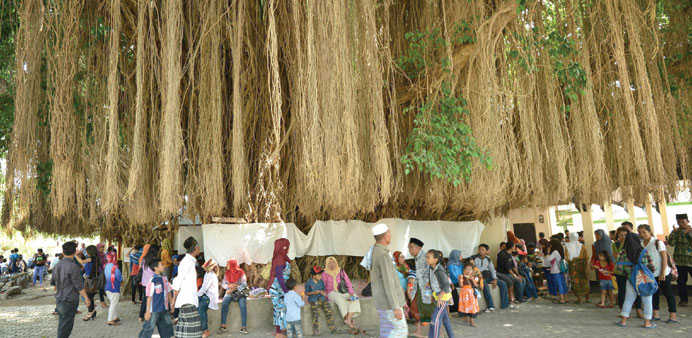By Olivia Rondonuwu, AFP/Jakarta
Just a short hop from the Indonesian holiday hotspot of Bali, a Saudi tourist and his family listen to the call to prayer as the sun goes down on Lombok, the self-styled “island of 1,000 mosques”.
Lombok is at the centre of an Islamic tourism drive in Indonesia, which has the world’s biggest Muslim population and is hoping to boost the number of visitors from wealthy Middle Eastern countries.
While aiming to continue to attract Western tourists who flock to its pristine beaches, the island is also seeking to promote its Islamic heritage, from numerous places of worship to shrines dedicated to ancient Muslim preachers.
“I love it here because I can hear the azan and people go to the mosque to pray,” said 58-year-old Sulaiman, the Saudi tourist, who gave only one name and was accompanied by his wife.
Indonesia is the world’s biggest archipelago nation, made up of more than 17,000 islands, but has long lagged behind smaller, more developed countries in Southeast Asia, such as Malaysia and Thailand, in attracting tourists.
Foreign visitor arrivals to Indonesia rose to 8.8mn in 2013, according to official figures, compared with 25.72mn in Malaysia and 26.55mn in Thailand.
While there are no official figures for “Shariah” tourism in Indonesia, the sector is experiencing strong growth internationally.
In a recent report, Muslim-oriented business group CrescentRating, predicted the sector would be worth $192bn a year globally by 2020, up from $140bn in 2013.
“The economic growth of Middle Eastern countries is very good and we see an opportunity there,” senior tourism ministry official Rizki Handayani told AFP.
Only around 190,000 Middle Eastern visitors came to Indonesia in 2013, according to official figures, but authorities hope their Islamic tourism drive can increase numbers.
The government has produced tourist guides promoting Indonesia as a “Muslim friendly destination”. It highlights the country’s best “Shariah” tourism destinations and notes there are more than 600,000 mosques in the archipelago.
Lombok, long overshadowed by its better known neighbour, Hindu-majority Bali, hopes the drive can help raise its profile.
Authorities are planning to build a huge Islamic centre that will contain a mosque, a hotel and a study centre, and specially trained tour guides will point Muslim visitors in the direction of the nearest mosque at prayer time.
Other parts of Indonesia are hoping to benefit from the initiative. Aceh province, in western Indonesia and the only part of the country to enforce Shariah, and the capital Jakarta are both seeking to lure Middle Eastern tourists, who often bring many family members with them and spend lavishly.
Riyanto Sofyan owns a chain of nine Shariah-compliant hotels across Indonesia, including two in Jakarta.
A hotel must have signs pointing towards Makkah and copies of the Holy Qur’an in its rooms, as well as a kitchen where halal food can be prepared, to gain its first crescent moon.
Despite the optimism of officials, there are concerns that the push for Islamic tourism could put off other visitors who want to sunbathe in skimpy outfits and relax on the beach with a drink.
But the local government insists it can promote Shariah tourism without affecting the existing industry, and that party hotspots in the area - such as tiny Gili Trawangan island, off the west coast of Lombok - will remain unaffected.
Authorities are considering clearly demarcating areas more suited to Muslim guests, where Western tourists should cover up.
“We will make zones so that travel agents and guides have clear options depending on their guests’ wishes,” said local tourism chief M Nasir, adding that visitors were already told they should not wear skimpy clothing when they head into cities or visit religious sites.
Nevertheless for some Muslims, the clash of cultures may still be off-putting. While Sulaiman, who comes from Makkah, was enjoying his holiday in Senggigi, the main tourist strip on Lombok, some aspects made him feel uneasy.
“I am not comfortable with a tourist place where there are people wearing things that are too revealing,” he said.

Pilgrims gather around a huge tree at a historic Islamic shrine in Loang Baloq on the island of Lombok in Indonesia’s West Nusa Tenggara province.
